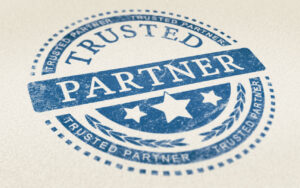Patrick Brightman - 03/17/2025
CMOs, marketing directors, and other brand builders are tasked with gaining leads, sales, and market share in an ever-increasingly competitive market. The goal is to gain loyal customers who will ultimately have a high lifetime value. That takes a marketing strategy that incorporates a mix of elements that does more than gain awareness. It must also build trust.
Earning trust is essential because most consumers are not in buying mode. In fact, only 3% of your B2B audience is ready to buy.* The other 97% is evaluating brands and determining who they will purchase from when it is time. In most cases, people will buy from brands they trust.
Don’t just take my word for it, though. Consider these stats. Fifty-nine percent (59%) of people are more likely to purchase new products when they trust the brand. Plus, two-thirds are more likely to stay loyal to and advocate for a brand they trust.

So, how do you gain trust? One effective way for a brand to build trust is by implementing a comprehensive public relations (PR) campaign. Effective PR will generate notable media placements that create third-party recognition and position a brand as a thought leader you can rely on.
How PR Builds Brand Trust
PR helps gains and builds trust in many ways, including:
Media Relations – Editorial placements do more than raise awareness of a brand. Gaining the implied third-party endorsement associated with media coverage helps a brand gain trust with its target audiences. It also helps position the brand as a thought leader, as spokespeople quoted in articles and/or interviewed during broadcast segments are widely considered experts.
Media training is critical to getting the most out of PR opportunities. Spokespeople who are media trained more clearly state key messages, creating an air of confidence. Media training also helps brand ambassadors convey key messages in a voice that resonates with the target audience. People will see such spokespeople as experts and – by extension – thought leaders.
Awards – Few achievements build credibility and trust more than awards. A comprehensive PR program includes an effort to earn accolades from organizations, media properties, government agencies, and other third parties.
There is a science to filling up your trophy case, however. It takes more than being qualified and identifying appropriate award categories. There is typically a specific submission process for each award. Understanding this is often the difference between being a winner or an also-ran. Experienced PR pros know how to put the best foot forward to stay ahead of the competition.
Speaking Engagements – Earning trust means connecting with your prospects. There are not many better ways to do that than by speaking directly to them, conveying a deep understanding of their challenges and how you can help solve them.
It is critical to speak your audience’s language. If you don’t know how to connect with audience members, nothing is gained. Leaders recognize those pain points and offer a solution using a voice that speaks to an audience. The latter point is critical. If they don’t “hear” you, they won’t trust you.
PR Synergies With Content
A key part of being trustworthy is delivering consistent messaging. There is an adage that “liars change their stories.” It’s Evasion over Evidence. For that reason, messages and positions conveyed through public relations must be supported by content on owned media (website and social media).
How can a brand achieve consistency? Integrating the key messages consistently stated in editorial and speaking engagements in blogs, social media, and other owned media is essential for a brand to build trust. The best way is to create a content calendar that aligns all marketing communications pieces – not only in messages but in scheduling. The result is better retention of a brand and what it means.
Maintaining consistency in all marketing initiatives is necessary to strengthen the connection between brand and consumer. Inconsistencies between what appears in media outlets and what is published on owned properties creates a disconnect that confuses consumers. Once they become confused, they begin to have doubt, which breeds mistrust.
Trusting Your PR Partner
Gaining consumer trust requires a strategy that is implemented by an experienced team. Here are some questions to ask a PR partner to see if they can help build trust in your brand:
- How do you build brand messages?
- What is your approach to pitching media – how do you develop and send pitches; how do you target media; what is your follow-up philosophy?
- What is the approach to coordinating PR, social media, and owned content?
- How long are your client relationships?
- Do reporters and editors reach out to you when working on stories?
- How do you report and measure success?
There are other questions, of course, but these are a good start.
Rise Above The Noise
In today’s competitive marketing world, rising above all the noise requires a strategic approach that includes a strong brand voice. Effective messages must be conveyed consistently on earned and owned media alike. It will separate a brand from its competitors, while building strong trust. The result will be that much of that 97% not ready to decide today will remember your brand in a positive light when it is time, giving you a distinct advantage – both short- and long-term. It will ultimately lead to higher Customer Lifetime Value (CLV).
If you are interested in building trust in your brand, reach out to me at pbrightman@3epr.com.
* based on book, Sticky Branding
